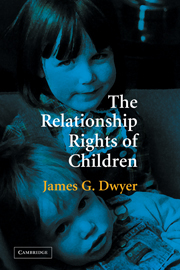Book contents
- Frontmatter
- Contents
- Acknowledgments
- THE RELATIONSHIP RIGHTS OF CHILDREN
- Introduction
- 1 Why Rights for Children?
- 2 The Existing Relationship Rights of Children
- 3 Paradigmatic Relationship Rights
- 4 Why Adults Have the Relationship Rights They Do
- 5 Extending the Theoretical Underpinnings of Relationship Rights to Children
- 6 Rebutting Defenses of the Status Quo
- 7 Implementing Children's Moral Rights in Law
- 8 Applications
- Appendix: The Conceptual Possibility of Children Having Rights
- Notes
- Index
7 - Implementing Children's Moral Rights in Law
Published online by Cambridge University Press: 23 July 2009
- Frontmatter
- Contents
- Acknowledgments
- THE RELATIONSHIP RIGHTS OF CHILDREN
- Introduction
- 1 Why Rights for Children?
- 2 The Existing Relationship Rights of Children
- 3 Paradigmatic Relationship Rights
- 4 Why Adults Have the Relationship Rights They Do
- 5 Extending the Theoretical Underpinnings of Relationship Rights to Children
- 6 Rebutting Defenses of the Status Quo
- 7 Implementing Children's Moral Rights in Law
- 8 Applications
- Appendix: The Conceptual Possibility of Children Having Rights
- Notes
- Index
Summary
The normative theoretical analysis has generated the conclusion that children possess these moral rights against the state in connection with disputes about their family relationships: (1) that they enjoy the freedom to choose for themselves in a significant range of cases and (2) that for all remaining cases, if the state presumes to involve itself in the disputes, it may do so only as agent for the child involved and must act with the exclusive aim of securing for the child the outcome that the child would likely choose for herself or himself if able. The second of these moral rights is likely to play a larger role in decisions about children's family relationships than the first, and it could be incorporated into the law in a variety of ways. In Section I below, I consider whether any particular approach is superior to others. Because I conclude that an ideal set of legal rules would likely prescribe individualized best-interest decision making in a broader range of cases than now occurs, I address in Section II criticisms that have been leveled against best-interests decision making for children. Then in Section III, I raise some novel questions about making children's interests determinative of relationship decisions, and in particular about how expansive a view one should take of the interests children have – for example, whether they should be deemed to include “other-regarding” interests in the welfare of other individuals, such as their biological parents, or of society as a whole.
- Type
- Chapter
- Information
- The Relationship Rights of Children , pp. 205 - 252Publisher: Cambridge University PressPrint publication year: 2006



